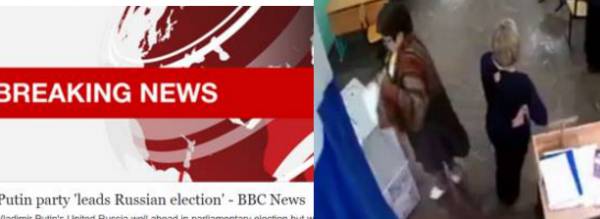What Breaking News? Mass Vote Rigging As Expected in Russian Parliamentary Elections

The ‘breaking news’ headlines on the BBC, Sky News and others would have been comical, were they not so misleading. These were not ‘elections’ which President Vladimir Putin’s ruling United Russia party was ever going to lose, and if you want even exit polls to be credible, you don’t effectively outlaw the Levada Centre, the main independent pollster, two weeks before voting day. Perhaps the brazenness of the methods used to achieve such a victory were also not headline material, but they would have been closer to the truth.
There are numerous reasons, including the exclusion of many opposition candidates and almost total lack of independent media for questioning the legitimacy of these elections. One is new and insurmountable. Moscow insisted on holding the elections in occupied Crimea and that alone invalidates the outcome. There were no international observers in Crimea and democratic countries have said that they will not recognize the vote.
Even Russia’s Central Election Commission acknowledged that the turnout was down on the last election, at 39%. Vedomosti reported that there had been a record low turnout in Moscow, and also gave a breakdown of turnout percentages in other regions. It is noticeable that those regions which seem most likely to use administrative resource and / or fiddle the records had high turnouts (Chechnya, for example, had almost 84% two hours before the polling stations closed). Voter apathy was not, however, universal. At least not if you believe that the 85 – 90% of Moscow remand prisoners and people in psychiatric hospitals who are reported to have voted did so of their own free will.
Political observer Dmitry Oreshkin noted that everybody had expected a lower turnout, due to general apathy and disillusionment with the election system, though they didn’t expect it to be so huge.
Interestingly, he believes that the amount of rigging was actually lower and suggests that this was thanks to the efforts of the new head of the CEC Ella Panfilova.
Mass violations were undoubtedly seen during the 2011 elections. The protests which broke out over those elections, then later over Putin’s third presidency, were fairly violently crushed. Since then various legislative measures have been passed, including most recently, draconian ‘anti-terrorist’, ‘anti-extremist’ laws, which must certainly increase apathy. Since those elections, chief Kremlin critic Boris Nemtsov was gunned down almost opposite the Kremlin and many activists have either served or are serving long sentences.
There have certainly been numerous reports, photos and videos of vote rigging. The methods are all standard: ‘carousels’ with people being taken by bus to ‘vote’ many times; multiple ballot papers being thrust into the ballot boxes, etc.
Oleg Kozyrev reported, for example, that in Khimki locals had not been able to vote because of the huge queues of ‘carousel voters’.
Panfilova has promised that ballot papers will be rejected. If the rigging got recorded, presumably.
In Rostov on the Don, for example, multiple ballot papers were thrust into the box with the election commission staff appearing to be covering the colleague carrying this out.
All of this was seen in Ukraine during the elections which led to the first Maidan – the so-called Orange Revolution. Under the presidency of Viktor Yanukovych, various amendments were made to electoral legislation, with all of them effectively aimed at making it easier to rig the results. One particular method was ensuring that ‘reliable people’ ended up on the election commissions which oversee the voting and the vote count.
There are also, of course, the ways that are much harder to prove, such as buying people’s votes. There is an ever-mounting number of Russians, especially pensioners, who are desperately poor and could very easily be persuaded.
As of 20.25 on Sunday evening, the Map of Electoral Violations had recorded 3, 250 infringements.
Whether this is fewer or not requires a detailed comparison. One Novosibirsk voter’s experiences, however, suggest that reporting infringements can be fraught. OVDinfo reports that the police took a voter, identified only as Vladimir, to the police station to write an explanation. He had phoned to report that people were standing outside the polling station offering money if people voted for United Russia. It was Vladimir who received a visitation from the police.





